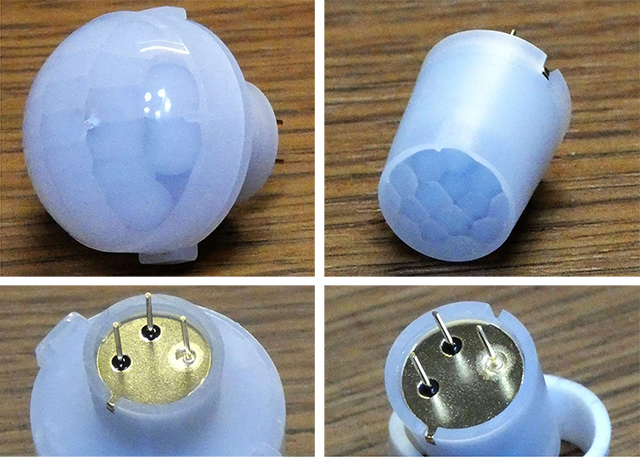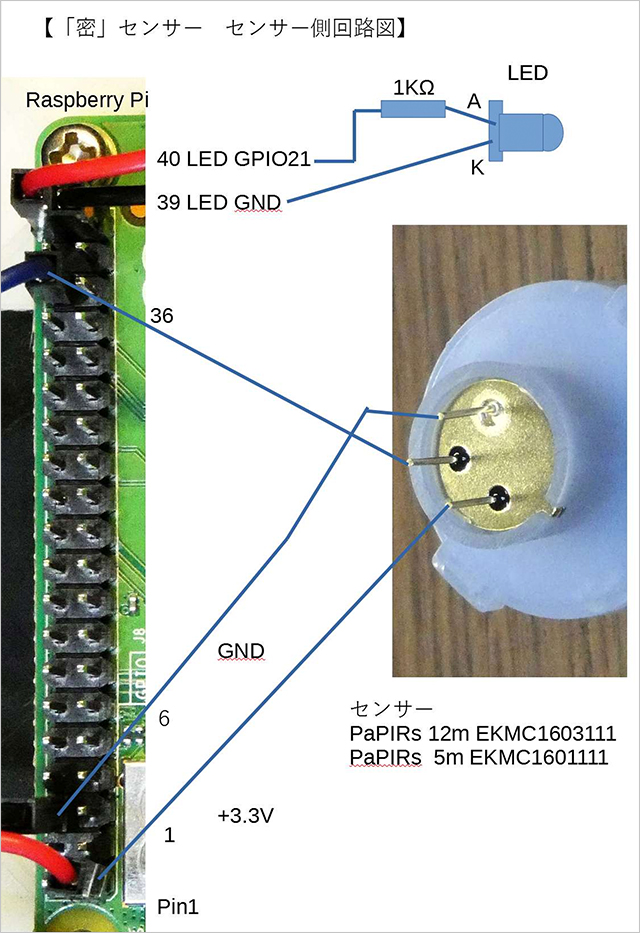
理事
三田 典玄
〔1〕特定の場所の人の「密」を検知し遠隔地に知らせるセンサを試作する
【概要】
※本センサは、小さな筐体の中に、人感センサ(人の「動き」を検知する)、超小型コンピュータ、無線LANインターフェイスを持ち、指定されたインターバルで、インターバル間の人の動きの「数」をカウントすることによって、その場所(最大で半径12m以内の半円)の人の「密」を測ることができます。
※計測された数値は、インターネット上でやり取りされるため、世界中のどこでも、インターネット接続さえあれば、それを知らせ、集計することができます(今後のプログラムの拡張次第です)。また、人が密になって危険な数値になった場合は、その場所の「密アラーム」を出すこともできます(これも、今後のプログラムの拡張次第です)。また、AWSなどのクラウド上にサーバーを別途用意し、そこで動くソフトウエアを開発し、用意すると、数台から数万台の世界各地に散らばった同センサの統計処理も可能です。統計データが集まれば、人が密になる場所の予測などをAIで行うことも可能になります(別途AIソフトウエアの開発が必要)。
※センサは「焦電センサ」と呼ばれる「人体の体温付近を選択的に取得する赤外線センサ」を使うため、センサそのものの価格が低廉(ホームセンターなどで売っているトイレなどの照明の自動点灯につかわれています)で、カメラなどを使う方式とは違い、プライバシーにも配慮がされています。
【特徴】
1.人の「密」を検知します。値は「人の動き」を示すカウント値になります。
2.検知した「密」に対し、カウント値が一定以上であることを検知し、アラームを出せます。
3.統計情報が出せます。
4.リアルタイムでメールなどに知らせることができます。(本試作開発の簡易サーバーの機能)
5.インターネットを通じて、世界のどこでも、人の「密」のデータを知ることができます。
6.必要であれば、センサ側の蓄電池と太陽電池での駆動も可能です(試作品ではこの機能なし)。
【試作品の製造コスト概算】
現在の試作品でのコスト概要は一台あたり以下です。
実際の製品には、美しい画面を作るなど、ソフトウエア開発のコストが別途かかります。
1.人感センサ(約500円)
Panasonic製の「PaPIRs 12m EKMC1603111」(半径12m用)または、
Panasonic製の「PaPIRs 5m EKMC160111」(半径5m用)を使用しています。
※今回はこのセンサを使いましたが、同様の他社製品もあるはずです。
2.超小型ボードコンピュータ(約¥3,000-)
Raspberry Pi 3 Model A+を使いました。
※Raspberry Piの他のモデルも利用可能ですが、CPUのスピードにより、検知のカウント値が変わります。
3.電源供給用USBケーブル(約¥100-)
4.筐体(約¥800-)
5.他は、政策人件費。ソフトウエアが完備していれば、1台あたり約30分。
以上、人件費を除いた部品代合計は、¥4,400-(量産時は、さらに個々の部品の数量値引きがあるかと思います)
以下、試作品の写真です。ご覧のように、コンピュータに更に小さいものを使うことによって、更に小さなものにできます。消費電力も更に小さくできます。現在の消費電力は5V/0.1Aです。
※一番右の写真は、試作の簡易型ではありますが、メールで10分ごとに送られてくる画面で、メール到着時点から、190分前までの人の動きが見られます。現在のところ、1年間の稼働で問題なく動いています。このインターバルの時間はプログラムで設定できます(試作プログラムの場合)。


【センサ側回路図】

【プログラム利用・改造・発表・商用利用は自由です】
※本ハードウエアの回路図、及びプログラムの改変、改造を歓迎します。
※本プログラム等の資料は、全て「参考」として、使ってください。完全なものではありません。
※本プログラム等は、完全にPublic Domainに置きます。改変、改造には、三田の許可なく行っても問題はありません。
※実際のアラームの設置、アラームの値は、サーバー側のプログラムの改造で行いますが、実機でのテストが必要です。実機によって、カウント数値が変わります。
ちなみに、本試作プログラムとハードウエアでは
– 45カウント以下は、人がいなくてもカウントされる可能性がある。
– カウント数によって、メールの文面、WebのHTMLで検知カウントの評価を変えている表示をしています。
– 本試作プログラムでは、LEDも点灯させており、常時点灯させ、カウントが行われると、LEDが一瞬消える、というようになっています。
この試作プログラムも、この方針で書かれています。
※プログラムはそれぞれ200行以内の小さなものです。十分理解したうえ、必要であれば改造を加えて、自由にお使いください。
【センサ側プログラム(サンプル)】
●Raspberry Pi内でコンパイルするときの簡単なコンパイル用シェルスクリプト
xxxx.c と tcpcli.c がプログラムです。wiringPiライブラリを使います。
cc xxxx.c tcpcli.c -o xxxx -lwiringPi
●メインプログラム(xxxx.c)
#include <stdio.h>
#include <wiringPi.h>
#include <unistd.h>
#include <signal.h>
#include <stdlib.h>
#define PORT (27)
#define LED (29)
#define IPADDR "192.168.1.4" // IP Address for Server. Please change this value.
#define TCPPORT (9022)
#define BUFFER_SIZE (2048)
#define MAX_COUNT (10000)
#define FETCH_TIME (600)
#define NOCNT "NOCNT\0"
#define CNT_BUFFER_SIZE (100)
#define LEDON (1)
#define LEDOFF (0)
// #define DEBUG 1
int timeover = 0;
extern void ClientSendData(char *,char *,int);
void timeisover()
{
timeover = 1;
}
#if 1
void LEDAction(void)
{
int fret;
if(0 > (fret = fork())) // fork Error
exit(1);
else if (0 < fret) // Parent
{
(void)signal(SIGCHLD,SIG_IGN);
return;
}
else if(0 == fret) // Child
{
digitalWrite(LED,LEDOFF);
delay(300);
digitalWrite(LED,LEDON);
exit(0);
}
}
#else
void LEDAction(void)
{
digitalWrite(LED,LEDOFF);
}
#endif
int main(void){
int data,datap,i;
#ifndef DEBUG
if(0 != fork())
exit(0);
#endif
if(0 > wiringPiSetup())
{
printf("No wiringPi.\n");
return 1;
}
pinMode(PORT,INPUT);
pinMode(LED ,OUTPUT);
datap = digitalRead(PORT);
i = 0;
#ifdef DEBUG
printf("Now Status=[%d]\n",datap);
#endif
(void)signal(SIGALRM,timeisover);
alarm(FETCH_TIME);
timeover = 0;
ClientSendData("00000\0",IPADDR,TCPPORT); // Send Activated Sign for the Server.
digitalWrite(LED,1); // Connection OK. LED ON.
for(;;){
if(timeover)
{
char bufx[CNT_BUFFER_SIZE + 2];
sprintf(bufx,"%05d\0",i); // Counter Value writeout.
i = 0; // Counter Reset.
ClientSendData(bufx,IPADDR,TCPPORT); // Send Data to Server.
#ifdef DEBUG
printf("SEND[%s]\n",bufx);
#endif
(void)signal(SIGALRM,timeisover); // Set next signal.
alarm(FETCH_TIME); // Set next fetch time.
timeover = 0; // Reset TIMEOUT flag.
continue;
}
data = digitalRead(PORT);
if(datap != data)
{
char buffer[BUFFER_SIZE +2];
datap = data;
if(data != 0)
{
i++;
#ifdef DEBUG
printf("[%06d]GPIO%d = %d\n",i,PORT,data);
#endif
LEDAction();
}
}
}
return 0;
}
●メインプログラム内部で使われているサーバーとの通信部分のプログラム(tcpcli.c)
#include <stdio.h>
#include <stdlib.h>
#include <string.h>
#include <ctype.h>
#include <errno.h>
#include <sys/types.h>
#include <sys/ioctl.h>
#include <sys/socket.h>
#include <netinet/in.h>
#include <netdb.h>
#include <sys/stat.h>
#include <fcntl.h>
#include <unistd.h>
/* Global valiables */
struct sockaddr_in client_addr; // write socket
/*
Connect to Server
*/
int ConnectServer(char *ipaddr, int port)
{
int sockfd; // Listen Socket File Descripter
if(0 > (sockfd = socket(PF_INET, SOCK_STREAM,0))) // Make Socket
{
perror("reader: socket");
return (-1);
}
bzero((char *)(&client_addr),sizeof(client_addr)); // clear struct for read
client_addr.sin_family = PF_INET; // set value to struct
client_addr.sin_addr.s_addr = inet_addr(ipaddr); // set value to struct
client_addr.sin_port = htons(port); // set value to struct
if(0 > connect(sockfd,(struct sockaddr *)(&client_addr),sizeof(client_addr)))
{
perror("Client: Cannot Connect\n");
close(sockfd);
return (-1);
}
return sockfd;
}
/*
Send Data to Server
*/
int SendDataToServer(int fd,char *data,int datalen)
{
if(0 > write(fd,data,datalen))
{
perror("Client: Cannot Send.\n");
close(fd);
return (-1);
}
return datalen;
}
/*
Client systen Send Data
*/
int ClientSendData(char *bufx,char *ipaddrx,int portx)
{
int sockax;
int len;
char cntbuff[256];
if(0 > (sockax = ConnectServer(ipaddrx,portx)))
{
printf("CLIENT: Cannot Connect Server.\n");
return(-1);
}
len = strlen(bufx);
sprintf(cntbuff,"%-6d\0",len);
SendDataToServer(sockax,cntbuff,CNTLEN); // Send Data Length.
SendDataToServer(sockax,bufx,len); // Send data.
close(sockax); // Close Socket.
return len;
}
※コンパイル時に若干Warninngが出ます。これは、TCP/IPのライブラリの新旧によるもので、通常は問題なく動きますが、問題がある場合はWarninngが出た部分を書き換えてください。
【サーバー側プログラム(サンプル)】
●コンパイルのためのシェルスクリプト
cc xxxx.c tcpserv.c -o xxxx
プログラムは「xxxx.c」と「tcpserv.c」、出来上がるバイナリプログラムは「xxxx」です。
●メインプログラム(xxxx.c)
※ヘッダの部分は各自の環境に合わせて書き換えてください。望むべくは、外部パラメータにして、設定するように、プログラムを書き換えたいですが、今回は緊急なので、エッセンスをわかっていただくためにも、簡単なプログラムにしています。
#include <stdio.h>
#include <stdlib.h>
#include <unistd.h>
#include <time.h>
#include <string.h>
// #define DEBUG 1 // If debug, Set 1
#define PORT (9022)
#define LOW_VALUE (45)
extern int ServerInit(int);
extern int WaitIncomming(int);
extern void ServerReadDatas(char *,int);
extern char *AcceptedIP;
#define BUFFER_SIZE (2048)
#define FETCH_TIME (600) // fetch time is 1-min
#define HTML_FILE "/var/www/xxxx/human/index.html" // Result HTML file
#define HTML_URL "http://xxxx.or.jp/human/index.html" // Result HTML URL
#define EMAIL_FILE "/home/xxxx/human/email" // Email text temporaly file
#define TO_LINE "To:%s\n"
#define TO_ADDRESS "xxxx@xxxx.com" // Email Send to xxxx@xxxx.com
#define FROM_LINE "From:%s\n"
#define FROM_ADDRESS "yyyy@yyyy.com" // Email From Address
#define SUBJECT_LINE "Subject:%s\n"
#define SUBJECT "Human Moving Report"
#define NOCNT "NOCNT\0"
#define NOT_ACTIVE (2)
#define ACTIVE (500)
#define CNTBUF_NUM (20)
#define BAR_LEN (100)
#define BAR_RATE (100)
#define NETSTAT_FILE "/home/xxxx/human/netstat.txt" // Netstat temporaly file
#define NETSTAT_COMMAND "/bin/netstat -t -n | /bin/grep 192.168.1 | /bin/grep %d > %s"
int cntbuf[CNTBUF_NUM];
void Clearcntbuf(void)
{
int i;
for(i = 0 ; i < CNTBUF_NUM ; ++i)
cntbuf[i] = 0;
}
// SendEmail Real
/*
Send E-Mail
*/
void SendEmail(char *body)
{
FILE *fp;
FILE *fpin;
int i;
char EmailCommandLine[BUFFER_SIZE + 1];
if((FILE *)NULL == (fp = fopen(EMAIL_FILE,"w")))
{
printf("Cannot open Email File[%s]\n",EMAIL_FILE);
exit(1);
}
sprintf(EmailCommandLine,NETSTAT_COMMAND,PORT,NETSTAT_FILE);
system(EmailCommandLine);
if((FILE *)NULL == (fpin = fopen(NETSTAT_FILE,"r")))
{
printf("Cannt Open NETSTAT_FILE[%s]\n",NETSTAT_FILE);
exit(1);
}
fprintf(fp,TO_LINE,TO_ADDRESS);
fprintf(fp,FROM_LINE,FROM_ADDRESS);
fprintf(fp,SUBJECT_LINE,SUBJECT);
fprintf(fp,"\n\n");
for(i = 0;i < 100 ; ++i)
{
char *pp;
char NetstatLine[BUFFER_SIZE];
if((char *)NULL == fgets(NetstatLine,BUFFER_SIZE,fpin))
{
fclose(fpin);
break;
}
else
{
fprintf(fp,"%s",NetstatLine);
}
}
fprintf(fp,"\n\n");
fprintf(fp,"%s\n\n%s\n\n.\n\n",body,HTML_URL);
fclose(fp);
sprintf(EmailCommandLine,"/usr/sbin/sendmail %s < %s",TO_ADDRESS,EMAIL_FILE);
system(EmailCommandLine);
}
// Send Email Interval
void SendEmailInterval(int mincnt)
{
char buffern[BUFFER_SIZE + 2];
char *p;
time_t now;
char *nowtime;
(void)time(&now); /* Get time for now */
nowtime = ctime(&now); /* convert to strings */
for(p = nowtime ; (*p) != (char)0 ; p++)
if((char)('\n') == (*p))
{
*p = (char)0;
break;
}
#ifdef DEBUG
printf("[%s] Count=%d in %d sec.\n",nowtime,mincnt,FETCH_TIME);
#endif
if(NOT_ACTIVE > mincnt)
sprintf(buffern,"[%s] NOT-ACTIVE: X In %d sec. there are %d actions.\n",nowtime,FETCH_TIME,mincnt);
else if(ACTIVE > mincnt)
sprintf(buffern,"[%s] ----ACTIVE: *** In %d sec. there are %d actions.\n",nowtime,FETCH_TIME,mincnt);
else
sprintf(buffern,"[%s] EXT-ACTIVE: ***** In %d sec. there are %d actions.\n",nowtime,FETCH_TIME,mincnt);
SendEmail(buffern);
}
// Make Web Pages
void MakeWebPage(int cnt_fetch)
{
FILE *fp;
time_t now;
char *nowtime;
char *p;
int i;
for(i = (CNTBUF_NUM - 1) ; i > 0 ; --i)
cntbuf[i] = cntbuf[i - 1];
cntbuf[0] = cnt_fetch;
if((FILE *)NULL == (fp = fopen(HTML_FILE,"w")))
{
printf("Cannot open FILE[%s]\n",HTML_FILE);
exit(1);
}
fprintf(fp,"\n");
fprintf(fp,"\n");
fprintf(fp,"\n",FETCH_TIME);
fprintf(fp,"Human Alive Check \n");
fprintf(fp,"\n");
fprintf(fp,"\n");
(void)time(&now); /* Get time for now */
nowtime = ctime(&now); /* convert to strings */
for(p = nowtime ; (*p) != (char)0 ; p++)
if((char)('\n') == (*p))
{
*p = (char)0;
break;
}
for(i = 0 ; i < CNTBUF_NUM ; ++i)
{
int blen;
char bar[BAR_LEN + 2];
int ix;
if(LOW_VALUE >= cntbuf[i])
{
bar[0] =(char)('-');
bar[1] =(char)0;
}
else if(BAR_RATE > cntbuf[i])
{
bar[0] = (char)0;
}
else
{
blen = cntbuf[i] / BAR_RATE;
for(ix = 0 ; ix < blen ; ++ix)
{
bar[ix] = (char)('*');
}
bar[blen] = (char)0;
}
fprintf(fp,"[%03d min ago] [%06d] %s
\n",(i * 10),cntbuf[i],bar);
}
fprintf(fp,"
\n");
fprintf(fp,"IP=[%s]",AcceptedIP);
fprintf(fp,"
\n");
if(0 < cnt_fetch)
fprintf(fp,"** [%s] ALIVE. COUNT=[%d]
\n",nowtime,cnt_fetch);
else
fprintf(fp,"** [%s] NOT ALIVE?
\n",nowtime);
fprintf(fp,"\n");
fprintf(fp,"\n");
fclose(fp);
}
// TIMEOUT FUNCTION
int main()
{
int socka,sockb;
char buffer[BUFFER_SIZE+2];
#ifndef DEBUG
if(0 != fork()) /* if it's a parent, then quit */
exit(0);
#endif
Clearcntbuf(); /* Count Buffer Clear */
for(;;)
{
if(0 > (socka = ServerInit(PORT)))
{
printf("cannot init TCP/IP.\n");
exit(1);
}
if(0 > (sockb = WaitIncomming(socka)))
{
printf("No Datas.\n");
exit(1);
}
ServerReadDatas(buffer,sockb);
#ifdef DEBUG
printf("[%s]\n",buffer);
#endif
close(socka);
close(sockb);
SendEmailInterval(atoi(buffer));
MakeWebPage(atoi(buffer));
}
}
●通信部分プログラム(tcpserv.c)
/* TCP Server */
#include <stdio.h>
#include <stdlib.h>
#include <string.h>
#include <ctype.h>
#include <errno.h>
#include <sys/types.h>
#include <sys/ioctl.h>
#include <sys/socket.h>
#include <netinet/in.h>
#include <netdb.h>
#include <sys/stat.h>
#include <fcntl.h>
#include <unistd.h>
#include <malloc.h>
int writer_len; // Data Write Length
struct sockaddr_in reader_addr; // read socket
struct sockaddr writer_addr; // write socket
int readedbytes;
int readbytes;
char *p;
char AcceptedIP[256];
#define CNT_BYTES (6)
#define TESTPORT (8001)
/*
Read specified bytes from client
*/
void ReadBytes(int fd,char *buff,int bytes)
{
int readbytes;
int readedbytes;
char *p;
p = buff;
readbytes = bytes;
readedbytes = 0;
bzero(buff,bytes);
for(;;)
{
if(0 > (readedbytes = read(fd,p,readbytes)))
{
printf("ReadError in Line %d.\n",__LINE__);
}
if(bytes > readbytes)
{
p = p + readedbytes;
readbytes = readbytes - readedbytes;
}
else
break;
}
}
/*
Server Ready
*/
int ServerInit(int port) // return Socket
{
int yes = 1;
int usv;
int sockfd;
if(0 > (sockfd = socket(PF_INET, SOCK_STREAM,0))) // Make Socket
{
perror("SERV: reader: socket");
return -1;
}
bzero((char *)(&reader_addr),sizeof(reader_addr)); // clear struct for read
reader_addr.sin_family = PF_INET; // set value to struct
reader_addr.sin_addr.s_addr = htonl(INADDR_ANY); // set value to struct
reader_addr.sin_port = htons(port); // set value to struct
setsockopt(sockfd,
SOL_SOCKET,SO_REUSEADDR,(const char *)&yes,sizeof(yes)); // Set Socket options
if(0 > bind(sockfd,(struct sockaddr *)(&reader_addr),sizeof(reader_addr))) // set bind
{
perror("SERV: reader: bind");
return -1;
}
if(0 != listen(sockfd,50)) // wait the connection
{
perror("SERV: reader: listen");
close(sockfd);
return -1;
}
return sockfd;
}
int WaitIncomming(int waitsock)
{
int new_sockfd;
writer_len = sizeof(writer_addr);
if(0 > (new_sockfd = accept(waitsock,(struct sockaddr *)(&(writer_addr)),(socklen_t *)(&(writer_len)))))
{
perror("SERV: reader: accept");
return(-1);
}
bzero(AcceptedIP,255);
// (void)strcpy(AcceptedIP,(char *)inet_ntoa(writer_addr.sin_addr));
return new_sockfd;
}
void ServerReadDatas(char *DataBuffer,int fda)
{
int cnt;
int len;
char counter[CNT_BYTES+2];
ReadBytes(fda,counter,CNT_BYTES);
counter[CNT_BYTES]=(char)0;
len = atoi(counter);
ReadBytes(fda,DataBuffer,len);
DataBuffer[len] = (char)0;
}
※プログラム内にコメントアウトした行、デバッグメッセージなどが残っています。
次回に続く-
【著者紹介】
三田 典玄(みた のりひろ)
一般社団法人 センサイト協議会 理事
株式会社オーシャン IoT事業推進部長
■略歴
東海大学工学部通信工学科卒業 ( アモルファス半導体物性専攻 ) 工学士
1986年 株式会社アスキーより「入門 C 言語」執筆/出版。
コアダンプ者創業。同社専務取締役(後に代表取締役)
〜2000年 以降、「実習C言語」「応用C言語」を続けて執筆・出版。
日本国内合計約100万部。
韓国戦後初の日本人が著者の大学の教科書として翻訳・採用。
1996年 東京大学先端科学技術センター 協力研究員。
2002年 独立行政法人・産業技術総合研究所 特別研究員(生命科学)
〜2003年 技能五輪世界大会・情報技術職種・委員
2006年 台湾新聞・日本語版副編集長
2011年 ジョルダン株式会社(JASDAQ上場)顧問 〜
2013年 韓国・慶南大学 工学部コンピュータ学科 教授 〜2015年
2015年 NPO法人・日本フォトニクス協議会知財戦略専門部会事務局長
及びITアドバイザー 〜現在著書多数。
2019年 株式会社オーシャン IoT事業推進部長
■知見
日本のインターネットの草分けの一人。
台湾、韓国を中心としたアジア各国の事情に精通。
サイバーセキュリティの専門家として「サイバー戦争」をKindleで出版。
IoTの専門家として「ラズベリーパイ」等IoTの学習者向け書籍をKindleで出版。
